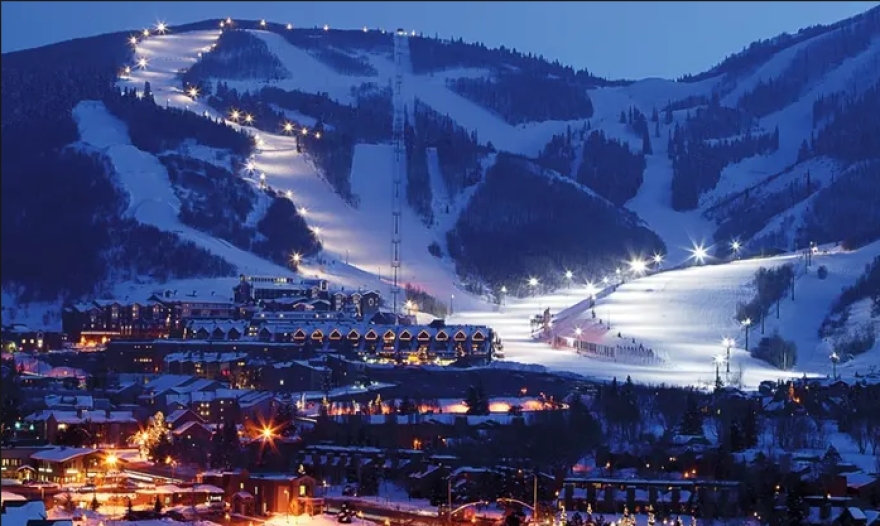Last week, KPCW spoke with Outside Magazine writer Marc Peruzzi about his article “The Giant Resort Companies You Hate Are Saving Skiing” in response to his article Brigid Mander wroter her own piece in Outside Magazine titled “Actually the Mega Season Pass is Killing Skiing”
Brigid Mander doesn’t fault Alterra Mountain Company or Vail Resorts for doing their job, but she does disagree with the multi-resort pass is good for skiing.
“Despite this pass, skiing is getting more expensive for your overall visitor, and that is supported in many statistics," Mander explained. "There's already a crunch. The mega passes are adding more pressure, more tourists, more visitors. Its straining infrastructure, it's straining capacity of employees. So, I fail to see how this is really helping anyone except for the major companies.”
Some would argue that the Ikon and Epic passes bring more skiers and therefore more revenue for restaurants and shops in town, Mander says it’s a double-edged sword.
“A lot of small companies can’t maintain employees because nobody wants to live somewhere where they're getting paid $12-$15.00 an hour and your rent is $1,200 a month," Mander continued. "They have trouble maintaining quality employees. They have trouble maintaining people for more than a—sometimes not even a full season because people give up. They may be replaced at some of the larger companies by J1 visa holders, which isn't great if you are thinking about maintaining your actual community.”
Mander argues that if the cheap mega passes existed in a vacuum, they’d be great, but she says the broader impact of these companies on resort towns is damaging.
“If you want to keep something functioning as a town as opposed to just a giant resort where it's not actually a functioning town and you don't have to count on any of those services, or quality of life that you would normally get in a town that's one thing," Mander said. "I live in Jackson and I actually pitched this article before this season before people just lost it over the Ikon Pass here. It was really, really crowded and I don't even blame the Ikon Pass holders themselves. They're like, ‘oh a great deal I'm going to go to Jackson.’ I think the hope is they’ll stay in all the hotels, and they'll spend all their money at the restaurants. I'm not sure that actually happened. Ultimately there's a point where your quality of life is so impacted by more visitors. Do you care that the sandwich shop is busier, or that the resort is making more money, and who is that actually benefiting?”
Mander says that mountain resort companies exacerbated issues that mountain towns already faced.
“I think local government has a lot to say in this," Mander explained. "The larger, more powerful, a company is—the harder it is for a town to try to protect itself. An anecdote I find to be amusing, but it's a serious one also of Summit County, Colorado. Vail brings in an enormous amount of people, pays them incredibly low wages. The town is already struggling with huge traffic problems, huge housing problems, huge labor shortages. So, I don’t see how this is good for skiing.”
Mander says that places where a resort brought about a town, instead of the other way around—such as Big Sky, Montana—have great need for stronger local government.
“They’re split between two Montana counties, with no town government," Mander continued. "Someone texted me a photo of employee housing in Big Sky that was three twin beds crammed into one hotel room with a hot plate. Even when I was the biggest ski bum, I would have never kept that job. I would have been like I'm out. Why am I working during the day for like $10.00 an hour and living in this wretched tiny place, but that's what people are expected to put up with it they want to be part of this dream. Those are the people that the resorts depend on to make it run. There are also people living in tents in the woods. People there are also very, very afraid to go on the record about anything that's making their lives miserable there. It'll be interesting to see how it plays out whether or not they keep trying to maintain some kind of standard for their employees or if they just move completely to outsourced labor. Which I think would really decline the quality of a ski trip for anyone. People who don't ski, don't care about skiing, they've been there for one season and that’s it.”
Mander’s article suggest skiers’ vacation at resorts that aren’t a part of the mega passes, but for those towns already impacted by these mountain corporations she offers no easy solutions but she says one thing she knows is that the money is leaving the mountain towns and going to big businesses.
“This is your home," Mander said. "You're raising your family here, or your job is here, or your business. So, I'm sorry I don't have a solution for Park City or for Jackson. The money you pay for your big pass and big resorts leaves. It goes to corporate headquarters in Broomfield and Denver. it's out, it’s not local money.”
You can find a link to her article “Actually The Mega Season Pass Is Killing Skiing” here.
You can find Leslie Thatcher's conversations with both Peruzzi and Mander below:





